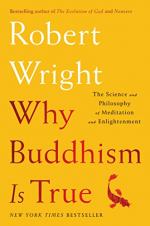
|
| Name: _________________________ | Period: ___________________ |
This test consists of 5 short answer questions, 10 short essay questions, and 1 (of 3) essay topics.
Short Answer Questions
1. The author repeatedly refers to the mental modules as temporarily taking what action against the focus of the mind?
2. What is Robert Zajonc's field of expertise?
3. The author states that he understands if the reader sees the words "formlessness" and "emptiness" and thinks of which two other words?
4. What doctrine emphasizes that nothing has any essence?
5. In the philosophical illustration focused on a charioteer and horses, what does the charioteer represent?
Short Essay Questions
1. What connection does the author make between awareness and control and how is paradox used within the author's discussion of this connection?
2. In what way does the author use the appeal of ethos within the chapter entitled "Encounters with the Formless"?
3. Explain the emptiness doctrine presented by the author within the chapter entitled Encounters with the Formless.
4. What is the significance of the author's anecdote about the sound of a buzz saw?
5. Discuss an instance when the author points out a potential pitfall of a regular meditation practice.
6. What four themes does the author state are generally focused upon within the passing thoughts observed during meditation?
7. Discuss the author's perspective of how indulging one's craving once can lead to future indulgences?
8. How does the author characterize the emotion of jealousy?
9. What is the purpose for observing one's own thoughts within a meditation session?
10. What is the author's message about the intertemporal utility function and its relationship to the permanence of the self?
Essay Topics
Write an essay for ONE of the following topics:
Essay Topic 1
How is the theme of desire portrayed in Robert Wright's book Buddhism is True? Examine the author's treatment of and messages regarding desire throughout the book.
Essay Topic 2
How does Robert Wright utilize irony within the text? Discuss at least three uses of irony within the book and explore each instance's connection to larger themes contained within the narrative.
Essay Topic 3
Read the List of Buddhist Truths included in the back of Robert Wright's book Buddhism is True. Write an essay explaining the connection between one of the Buddhist Truths and an example or anecdote provided by the author within the text.
|
This section contains 1,203 words (approx. 5 pages at 300 words per page) |

|




